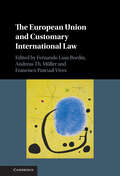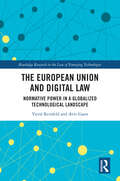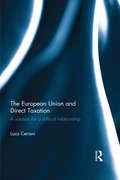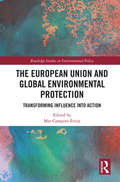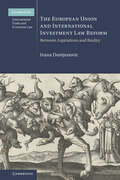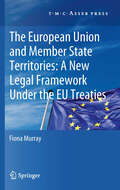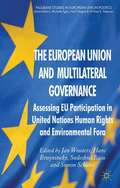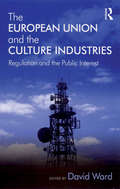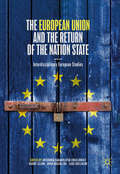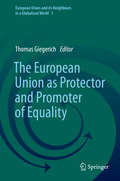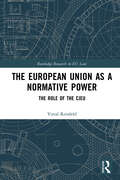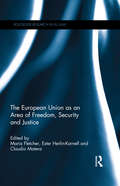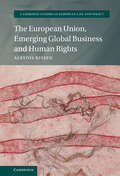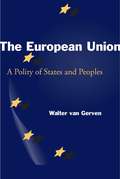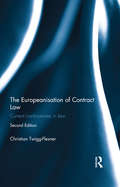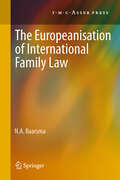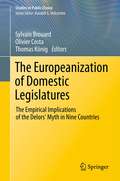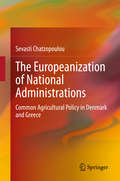- Table View
- List View
The European Union after the Treaty of Lisbon
by Ioannis Lianos Diamond Ashiagbor Nicola CountourisThis volume of essays casts light on the shape and future direction of the EU in the wake of the Lisbon Treaty and highlights the incomplete nature of the reforms. Contributors analyse some of the most innovative and most controversial aspects of the Treaty, such as the role and nature of the EU Charter of Fundamental Rights and the relationship between the EU and the European Court of Human Rights. In addition, they reflect on the ongoing economic and financial crisis in the Euro area, which has forced the EU Member States to re-open negotiations and update a number of aspects of the Lisbon 'settlement'. Together, the essays provide a variety of insights into some of the most crucial innovations introduced by the Lisbon Treaty and in the context of the adoption of the new European Financial Stability Mechanism.
The European Union and Customary International Law
by Fernando Lusa Bordin Th. Müller Andreas Francisco Pascual-VivesThe book gathers a group of scholars interested in both public international law and EU law to cover different facets of the relationship between the European Union and customary international law. Considering the distinct perspectives taken by international law and EU law, while also looking into the space in between the two, individual chapters tackle complex questions such as whether and on what bases the European Union is bound by customary international law as a matter of international law and EU law; how the European Union contributes to the development of international custom; and how different stakeholders – the Court of Justice of the European Union, the EU's political organs and EU citizens – rely upon customary rules. The book thus offers a systematic account of the relevance of customary international law for the external relations and internal functioning of what is no doubt the most remarkable regional international organization of our time.
The European Union and Digital Law: Normative Power in a Globalized Technological Landscape (Routledge Research in the Law of Emerging Technologies)
by Yuval Reinfeld Aviv GaonThis book introduces the concept of Technical Normative Power (TNP) to explain how the European Union (EU) transforms internal legal frameworks into external influence.Over the past two decades, the EU has emerged as a global regulatory force in the digital age. As technologies such as big data, cloud computing, and generative artificial intelligence reshape modern life, the EU has responded with a legal model grounded in rights-based governance, institutional coherence, and judicial authority. This book focuses on two emblematic instruments: the General Data Protection Regulation (GDPR) and the Artificial Intelligence Act (AIA). It examines how both EU legislation and the case law of the Court of Justice of the European Union (CJEU) work together to set global standards in data protection, AI governance, and digital rights. The EU’s ability to combine legal consistency, regulatory ambition, and market access has made it a key actor in shaping the global digital order. Structured in three parts, the book traces the evolution of EU digital regulation, analyzes the mechanisms of its legal and institutional architecture, and evaluates its impact on global governance.This book will be of interest to scholars, students, and professionals in EU law, digital regulation, artificial intelligence, and the law of emerging technologies.
The European Union and Direct Taxation: A Solution for a Difficult Relationship
by Luca CerioniWithin the European Union, direct taxation is an area which often provokes controversy due to tensions between the tax sovereignty of the individual Member States and the desire for an integrated internal market. This book offers a critical review of the legislative and case-law developments in this area at the EU level, and reviews the European Commission’s proposed solutions in light of their concerns regarding the proper functioning of the EU’s internal market. Luca Cerioni set out a series of benchmarks determined from the objectives expressed by the European Commission, including: the elimination of double taxation and double non-taxation; the simplification of cross-border tax compliance; the reduction of abusive forum-shopping practices and general aggressive tax planning strategies; legal certainty for all businesses and individuals carrying on activities and receiving income in more than one EU Member State. Cerioni uses these benchmarks to ask which Directives and/or rulings have left legal uncertainty, and which have ended up creating or increasing the scope for aggressive tax planning. The book puts forward a comprehensive solution for a new optimal regime relating to tax residence, which would contribute to the EU project to the mutual benefit of Member States and taxpayers. As a thorough and critical discussion of EU tax rules in force, and of the European Court’s case law in direct taxation, this book will be of great use to academic researchers and students of EU law, tax practitioners, and policy-makers at the EU and national level.
The European Union and Global Environmental Protection: Transforming Influence into Action (Routledge Studies in Environmental Policy)
by Mar Campins EritjaThis book examines how the EU can be a more proactive actor in the promotion of the principles of sustainability and fairness from a legal environmental perspective. The book is one of the results of the research activity of the Jean Monnet Chair in EU Environmental Law (2017-2020) funded by the European Commission under the Erasmus+ programme. The European Union and Global Environmental Protection: Transforming Influence into Action begins with an introduction of the key EU competences, instruments and mechanisms, as well as the current international challenges at the EU level. It then explores case study examples from four regulated fields: climate change, biodiversity, multilateral trade, unregulated fishing, and access to justice; and four unregulated areas: mainstreaming of the Sustainable Development Goals in EU policies, and environmental justice, highlighting the extent to which the EU might align with international environmental regimes or extend its normative power. This volume will be of great relevance to students, scholars, and EU policy makers with an interest in international environmental law and policy.
The European Union and International Investment Law Reform: Between Aspirations and Reality (Cambridge International Trade and Economic Law)
by Ivana DamjanovicIn order to understand the reform of international investment law envisioned by the EU, the author provides a comprehensive but concise analysis of the EU reform approaches, its constitutional and legal framework, the concepts of the rule of law and legitimacy, and the reasons for the reform. In particular, the book exposes tensions between the EU aspiration to enhance the rule of law in international investment law, as a means of legitimising this legal discipline, and the challenges of its reform approaches in practice. The analysis combines substantive and procedural aspects of the EU reform of international investment law in the intra-EU context and EU external relations. This book thus critically evaluates the EU vision of the rule of law in international law and its contribution to the development of international law in the field of investment.
The European Union and Member State Territories: A New Legal Framework Under the EU Treaties
by Fiona MurrayThe book reviews the EU Treaties provisions governing relations between the EU and Member State territories, such as the Netherlands Antilles, the UK Channel Islands and the French Overseas Departments. The book includes an overview of each of the relevant territories, including their present constitutional relations with their Member State and their legal relations with the EU. Prior to the entry into force of the Lisbon Treaty, the over-arching Treaty provision for this relationship was Article 299 of the EC Treaty. Having traced the development of Article 299 from 1957 to the present Lisbon framework, the book identifies many inconsistencies and issues with this current framework and proposes a new model framework, one that is more concise and up-to-date and which is adaptable to possible future developments. Useful for EU Law departments and Research Centres, EU Think Tanks, EU Institutions Libraries, Permanent Representatives to the EU and law firms specializing in EU law.
The European Union and Multilateral Governance
by Jan Wouters Hans Bruyninckx Sudeshna Basu Simon SchunzAn interdisciplinary approach to the study of the EU in UN human rights and environmental governance which addresses the legal and political science dimensions. With contributions from academics and policy-makers, this volume is a comprehensive analysis of how the challenges it faces impact on the EU's position in UN fora.
The European Union and the Culture Industries: Regulation and the Public Interest
by David WardThis edited collection brings together leading academics in their respective fields to examine the European Union's impact on media and public policy. It provides an analysis of the broader areas of EU policy and links these together to give a greater appreciation of the nuances and scope of EU regulatory initiatives and their impact on the member states. Under a broad public interest perspective, the authors provide an assessment of the success of EU policy in protecting the public interest in the culture industries and respecting certain normative principles and balancing these with market dynamics.
The European Union and the Return of the Nation State: Interdisciplinary European Studies
by Lars Oxelheim Anna Michalski Antonina Bakardjieva Engelbrekt Karin LeijonThis book explores the complex and ever-changing relationship between the European Union and its member states. The recent surge in tension in this relationship has been prompted by the actions of some member state governments as they question fundamental EU values and principles and refuse to implement common decisions seemingly on the basis of narrowly defined national interests. Furthermore, Brexit forces the EU for the first time to face the prospect of a major member state preparing to leave the Union. Are these developments heralding the return of the nation-state, and if so, in what form? Is the national revival a lasting phenomenon that will affect the EU for a long time to come, or is it a transitory trend? This book takes an interdisciplinary approach to answer these questions. It brings together scholars from economics, law, and political science to provide insights into the multifaceted relations between the Union and its member states from different perspectives. All chapters are based on up-to-date research findings, succinct assessments of the current state of affairs and ongoing debates about the direction of European integration. The book concludes by offering policy recommendations at European and national levels.
The European Union and the Technology Shift
by Lars Oxelheim Anna Michalski Antonina Bakardjieva Engelbrekt Karin LeijonThis book explores the multiple challenges that the global technology shift is posing to the EU. It raises the question of how European societies will mobilize the positive effects of the rapid technological advancement in digitalization, robotization, and artificial intelligence, while mitigating the negative consequences in terms of job losses, cybercrime, and social and political polarization. From the vantage point of experts from economics, law, and political science, this book provides insights into the role that the EU is and ought to be playing in regulating global platform companies, addressing taxation in the digital economy, mitigating job displacements on the labour market, and tackling ethical concerns of artificial intelligence and the prospect of digital democracy. All chapters are based on up-to-date research findings, succinct assessment of the current state of affairs and ongoing debates. They conclude with policy recommendations for policy makers on European and national levels.‘This volume has a solid foundation in the highly topical question of technological change. More importantly, the individual chapters are written by qualified scholars whose analytically advanced contributions are likely to interest a wide audience. I can strongly recommend this book for scholars and students in political science, law, and economics.’ —Carl Fredrik Bergström, Professor of European Law, Uppsala University, Sweden ‘When the Commission took office in 2019, it put forward its vision as to how Europe’s digital future could be ‘shaped’ in a way that makes the digital transition enrich people’s lives and make sure that European businesses fully benefit from the opportunities offered by digital technologies. Then COVID drastically accelerated the take up of digital solutions. As the digital transformation affects every single one of us it is important that we have the widest possible debate on its inherent risks and opportunities. This is why I warmly recommend this book. It brings together an inter-disciplinary set of scholars able to analyse the multifaceted implications of the technological shift. And I could not agree more with the book’s main takeaway, i.e. that we need to create an adaptive regulatory framework capable of harnessing the positive effects of technological changes while buttressing the negative impact on European society and citizens.’ —Ambassador Kim Jørgensen, Head of Cabinet to Commissioner and Executive Vice-President Margrethe Vestager, European Commission
The European Union as Guardian of Internet Privacy
by Hielke HijmansThis book examines the role of the EU in ensuring privacy and data protection on the internet. It describes and demonstrates the importance of privacy and data protection for our democracies and how the enjoyment of these rights is challenged by, particularly, big data and mass surveillance. The book takes the perspective of the EU mandate under Article 16 TFEU. It analyses the contributions of the specific actors and roles within the EU framework: the judiciary, the EU legislator, the independent supervisory authorities, the cooperation mechanisms of these authorities, as well as the EU as actor in the external domain. Article 16 TFEU enables the Court of the Justice of the EU to play its role as constitutional court and to set high standards for fundamental rights protection. It obliges the European Parliament and the Council to lay down legislation that encompasses all processing of personal data. It confirms control by independent supervisory authorities as an essential element of data protection and it gives the EU a strong mandate to act in the global arena. The analysis shows that EU powers can be successfully used in a legitimate and effective manner and that this subject could be a success story for the EU, in times of widespread euroskepsis. It demonstrates that the Member States remain important players in ensuring privacy and data protection. In order to be a success story, the key stakeholders should be prepared to go the extra mile, so it is argued in the book. The book is based on academic research for which the author received a double doctorate at the University of Amsterdam and the Vrije Universiteit Brussels. It builds on a long inside experience within the European institutions, as well as within the community of data protection and data protection authorities. It is a must read in a time where the setting of EU privacy and data protection is changing dramatically, not only as a result of the rapidly evolving information society, but also because of important legal developments such as the entry into force of the General Data Protection Regulation. This book will appeal to all those who are in some way involved in making this regulation work. It will also appeal to people interested in the institutional framework of the European Union and in the role of the Union of promoting fundamental rights, also in the wider world.
The European Union as Protector and Promoter of Equality (European Union and its Neighbours in a Globalized World #1)
by Thomas GiegerichThis book considers the European Union as a project with a major antidiscrimination goal, which is important to remember at a time of increasing resentment against particularly exposed groups, especially migrants, refugees, members of ethnic or religious minorities and LGBTI persons. While equality and non-discrimination have long been core principles of the international community as a whole, as is made obvious by the UN Charter and the Universal Declaration of Human Rights, they have shaped European integration in a particular way. The concepts of diversity, pluralism and equality have always been inherent in that process, the EU being virtually founded on the values of equality and non-discrimination. The Charter of Fundamental Rights of the EU contains the most modern and extensive catalogue of prohibited grounds of discrimination, supplementing the catalogue enshrined in the European Convention on Human Rights. EU law has given new impulses to antidiscrimination law both within Europe and beyond. The contributions to this book focus on how effective and credible the EU has been in combatting discrimination inside and outside Europe. The authors present different (mostly legal) aspects of that topic and examine them from various intra- and extra-European angles.
The European Union as a Normative Power: The Role of the CJEU (Routledge Research in EU Law)
by Yuval ReinfeldExamining the role of the CJEU in shaping the European Union as a Normative power, this book explores the influence of the Court of Justice of the European Union on Normative Power Europe to evaluate the extent to which the CJEU’s actions consolidate normative foreign policy in third states. Combining perspectives from international relations and law, it explores the EU’s normative impact in the international arena, offering a multidimensional view which characterizes the power of the EU as a normative power while examining its role as a regulatory power alongside a historical review of the legal doctrinal development of the CJEU. Distilling the EU's uniqueness in the international arena and emphasizing that its fundamental strength lies in the technical normative power approach, the book argues that the genuine EU impact is emphasized in unique sectoral niches noting the EU’s dominance in terms of agriculture, environmental protection, privacy, and data protection or tech policies- a classic technical normative power that combines a legal basis and a value base.The book analyses several case studies which present the triangular relations between CJEU rulings, EU institutions, and third countries to identify both direct and indirect signs of a genuine normative effect. Taking an interdisciplinary approach, this book will be of interest to academics and students researching aspects of European law, international law, or international relations.
The European Union as an Area of Freedom, Security and Justice (Routledge Research in EU Law)
by Ester Herlin-Karnell Maria Fletcher Claudio MateraThis book presents a collection of essays on key topics and new perspectives on the EU’s Area of Freedom, Security and Justice (AFSJ) and has a Foreword by the President of the Court of Justice of the European Union, Prof. Dr. Koen Lenaerts. Europe’s area of freedom, security and justice is of increasing importance in contemporary EU law and legislation. It is worthy of special research attention because of its high-stakes content (particularly from an individual and a state perspective) and because its development to date has tangentially thrown up some of the most important and contentious constitutional questions in EU law. As the AFSJ becomes more and more intertwined with ‘mainstream’ EU law, this edited collection provides a timely analysis of the merger between the two. Showcasing a selection of work from key thinkers in this field, the book is organised around the major AFSJ themes of crime, security, border control, civil law cooperation and important ‘meta’ issues of governance and constitutional law. It also analyses the major constitutional and governance challenges such as variable geometry, institutional dynamics, and interface with rights around data protection/secrecy/spying. In the concluding section of the book the editors consider the extent to which the different facets of the AFSJ can be construed in a coherent and systematic manner within the EU legal system, as well as identifying potential future research agendas. The European Union as an Area of Freedom, Security and Justice will be of great interest to students and scholars of European law and politics.
The European Union in a Changing World Order: Interdisciplinary European Studies
by Lars Oxelheim Anna Michalski Antonina Bakardjieva Engelbrekt Niklas BrembergThis book explores how the European Union responds to the ongoing challenges to the liberal international order. These challenges arise both within the EU itself and beyond its borders, and put into question the values of free trade and liberal democracy. The book’s interdisciplinary approach brings together scholars from economics, law, and political science to provide a comprehensive analysis of how shifts in the international order affect the global position of the EU in dimensions such as foreign and security policy, trade, migration, populism, rule of law, and climate change. All chapters include policy recommendations which make the book particularly useful for decision makers and policy advisors, besides researchers and students, as well as for anyone interested in the future of the EU.
The European Union's Shaping of the International Legal Order
by Dimitry Kochenov Fabian AmtenbrinkThe European Union undoubtedly plays an important role in the formation of international law. This takes place through a number of avenues ranging from the simple existence of this supranational legal order within the sphere of international law to the actual influencing of international legal order. With contributions by leading scholars, this collection of essays constructs and analyses a new and stimulating approach in which the European Union is perceived as an active co-creator of the international legal order on a variety of planes. Providing concrete examples of the European Union's approach to the international legal order in different policy fields, this book will be a key reference point for a new active paradigm of EU external relations law.
The European Union, Emerging Global Business and Human Rights (Cambridge Studies in European Law and Policy)
by Aleydis NissenThe European Union: A Polity of States and Peoples
by Walter van GervenThis book provides a general introduction to the European Union (EU) as an ever closer union of states and peoples. It describes how, from its origin in 1958 as an economic community of six states, the EU has grown into a political entity of 25 states with a population of more than 450 million. It also explains the constitution-making process that is currently taking place—with a draft constitution now being submitted for ratification by the 25 member states. The book shows how the distinctive features of a democratic polity that characterize the separate EU member states are gradually replicated in the European Union and how the Union is on its way to becoming a democratic polity of its own kind. Van Gerven writes from a legal perspective, with an eye to political theory and recent American and European history, and with a diverse readership from both sides of the Atlantic in mind.
The European Union’s Trade Defence Modernisation Package: A Missed Opportunity at Reconciling Trade and Competition? (European Yearbook of International Economic Law #23)
by Patricia TrappAnti-dumping and anti-subsidy measures are the most important elements of the European Union's trade defence instruments. Since the beginning of the European integration process, they have been used to combat trade practices which are considered "unfair" and their distortive effects on competition in the internal market. However, while the imposition of trade defence measures aims to level the playing field between EU producers and their foreign competitors, it also produces negative effects on competition itself.Based on the role attributed to competition and trade defence policy respectively throughout the European integration process, this book argues that the trading bloc's trade defence instruments should not be designed or applied with the objective of granting maximum protection to EU producers, but that their use should be limited to what is necessary to ensure fairness in competition between EU producers and exporting producers.However, an analysis of the changes made to the European Union's Basic Anti-Dumping Regulation and the Basic Anti-Subsidy Regulation by the Trade Defence Modernisation Package reveals that several aspects of the European Union's modernised trade defence instruments do not meet this requirement. Rather than being limited to offsetting the unfair competitive advantages of producers practicing dumping or benefiting from subsidies, the reformed provisions go beyond this, distorting competition in favour of the EU industry instead. Furthermore, the book critically assesses the reformed rules relating to the integration of social and environmental aspects in the imposition of anti-dumping or anti-subsidy measures as well as the modernised basic regulations’ compatibility with WTO law.
The Europeanisation of Contract Law: Current Controversies in Law
by Christian Twigg-FlesnerCritical yet accessible, this book provides an overview of the current debates about the ‘Europeanization’ of contract law. Charting the extent to which English contract law has been subject to this activity, it is the ideal volume for readers unfamiliar with the subject who wish to understand the main issues quickly. It examines a range of key developments, including: a string of directives adopted by the European Union that touch on various aspects of consumer law recent plans for a European Common Frame of Reference on European Contract Law. Bringing together advanced legal scholarship, critically examining key developments in the field and considering the arguments for and against greater convergence in the area of contract law, this is an excellent read for postgraduate students studying contract and/or European law.
The Europeanisation of International Family Law
by N. A. BaarsmaChoice of law determines which national legal system applies to an international case. Currently many choice of law rules in the field of family law are regulated by national law. However, these national rules of the EU Member States are more and more displaced by common European rules. This book describes the changes brought by the Europeanisation of the choice of law on divorce. From the conclusions drawn in the field of divorce the concluding chapter discusses the changes of Europeanisation of international family law in a broader perspective.
The Europeanization of Domestic Legislatures
by Thomas König Olivier Costa Sylvain BrouardIn ten years 80 per cent of the legislation related to economics, maybe also to taxes and social aff airs, will be of Community origin." This declaration has been largely quoted, paraphrased and deformed by different authors, creating a persistent myth according to which 80% of the legislative activity of the national legislatures would soon be reduced to the simple transposition of European norms". This book addresses the topic of the scope and impact of Europeanization on national legislation, as a part of the Europeanization debate which raises normative concerns linked to the "democratic deficit" debate. The state of the art shows that there are many assumptions and claims on how European integration may affect national legislation and, more generally, domestic governance but that there is a lack of solid and comparative data to test them. The aim of the book is to give a solid and comparative insight into Europeanization focusing on effective outcomes in a systematic way. This book analyzes the period 1986-2008 and includes an introduction, a global overview of European legislative activities which set the background for Europeanization of national legislatures, 9 country contributions (8 EU member states + Switzerland) including systematic, comparative and standardized data, tables and figures, and a conclusion with a comparative analysis of the European and domestic reasons for Europeanization. All national contributions conclude that Europeanization of national legislation is much more limited than assumed in the literature and public debate. It is limited to 10 to 30% of laws (depending on the country), far less than the 80% predicted by Jacques Delors and mentioned daily by medias and public opinion leaders to demonstrate EU domination on member states. Beside that general statement, the various chapters propose a deep insight on EU constraint over national legislation, providing much information on the kind of laws and policies that are Europeanized, the evolution of this process through time, the impact of Europeanization on the balance of powers and the relations between majority and opposition at national level, the strategies developed by national institutions in that context, and many other issues, making the book of interest to academics and policy-makers concerned with Europeanization and national legislation.
The Europeanization of National Administrations: Common Agricultural Policy in Denmark and Greece
by Sevasti ChatzopoulouDrawing on comparative politics and social network analysis, this book examines how the domestic institutional and organizational settings, as well as the network governance patterns, determine variation in administrative responses to EU’s Common Agricultural Policy (CAP) in two European Union (EU) member states, Denmark and Greece. These two small member states represent the North and South dimensions of the EU. The north-south dimension in relation to administrative structures, respond differently to EU common policies―and to Common Agricultural Policy, specifically―which has not been studied in the Europeanization literature. Even though, the study of administrative responses to EU common policies is important as it has been especially noticeable during the current financial crisis. Europeanisation studies concentrate on either large Western European states (France, Germany and UK) or small Western Northern states. These studies produced detailed knowledge on specific countries and policy areas but they ignored the agricultural policy area and the importance of small Southern member states. By comparing a small Southern with a small Northern state since the accession to the EU, this book aims to fill this gap in the literature. Moreover, by linking the findings of the two cases to the member states that joined the EU in the 2004 fifth enlargement, and in other policy areas, it allows a better understanding of similar responses, either adaptation or inertia."This book represents an important contribution to the theoretical and empirical literature on Europeanisation and the Common Agricultural Policy (CAP). It systematically tackles an under studied question: does Europeanisation of policies lead to administrative change and convergence among the member states? The domestic administration of the EU CAP has remained domestically designed and monitored, resulting in divergence among the member states and gaps and imbalances in the performance of EU CAP decisions. The CAP is of more general interest because it combines regulatory and market intervention policy instruments. The analysis proceeds through in depth comparative historical case studies of Denmark and Greece which uses a sophisticated combination of quantitative and qualitative methodologies. The authoritative and informative analysis is structured by a focus on three key domestic factors. There is differentiated administration of common policies and while administration succeeds and adapts in one state, it does not necessarily do so in others, leading to differences in implementation performance. This book should provide a stimulus for further research." ―Wyn Grant, University of WarwickThe last 40 years have been crucial for the European agriculture. The Common Agricultural Policy fulfilled its primary objective, which led Europeans to shift its objectives and cope with the shortcomings created by the success of the Policy itself―manage surpluses and narrow the gap between farmers, due to price mechanism―as well as, adapt the policy following the successive enlargements and follow the developments in the global economy, in which we live nowadays. Dr. Chatzopoulou gives us a very accurate image on how differently actors of the agricultural economy, farmers, cooperatives and the administrations both in Greece and Denmark, behave. But also, how different is the structure of the sector in these two countries: in Denmark, almost everything is based upon a consensus, where there does not exist a law on cooperatives, and where the administration and the sector work together to adapt or to influence the decisions to take at European level. On the other hand, in Greece, farmers struggle to make their voice heard in the absence of professional organizations, the cooperatives are bound to work in the framework of a specific and strict law and the administration was not shown very cooperative with the sector. These two realities are very well illustrated by the author and many lessons are to be learnt thr
The Eurozone Crisis
by Kaarlo Tuori Klaus TuoriTopical and timely, this book offers an economically informed constitutional analysis on European responses to the crisis. It discusses the longer-term proposals on the table including rescue measures and stability mechanisms, as well as the tightening of European economic governance. The authors see the European constitution as a multidimensional and multi-temporal process of constitutionalisation. They examine how the crisis has catapulted the economic constitution back to the 'pacemaker' position from where it determines developments in the political and social dimensions. However, now the key role is not played by the constitution of 'microeconomics', focusing on free movement and competition law, but the constitution of 'macroeconomics', introduced in Maastricht.

